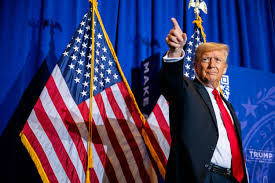The world appears to be in more than its usual
disorder. Religion is dividing societies and nations and, where religion is not
doing it, poverty and inequality are. Ask Isis and M. Thomas Piketty.
Homeless millions are migrating.
The globe is over-populated as well as overheated. Plastic is choking our oceans,
antibiotics hardly work anymore and robots are about to steal everyone's
jobs.
With Donald Trump elected as
President for the next four years, the United States of America is thought
by liberals to be doomed.
With Brexit scheduled for March 2019, Great Britain is thought by liberals to be doomed.
The European Union is thought to be doomed by conservatives.
With North Korea's Kim Jong-un defiantly building his nuclear arsenal, people think the world is doomed.
And here in South Africa, with President Zuma's African National Congress promising to rule till Jesus comes, the opposition know the country is doomed already. Everyone always said it would be once Nelson Mandela went.
The menace behind all these events is that something fundamental is doomed, not just the politicians
and governments of the day. Democracy was supposed
to take over and get things right when the USSR
collapsed and that has not happened. The word nowadays is democracy has failed. The people are up in arms. Democracy itself is doomed.
If only by way of relief, we should ask ourselves if that is true. If it is true, where is South Africa -
where are all of us - in all of this? What
are the alternatives? Where are we heading?
At the end of the 1980s, as the Soviet empire dissolved in a matter of months before the world's astonished eyes, Francis Fukuyama published The End of History.
Briefly, the
thesis of this much misrepresented book is that if there is such a thing as
progress, society must be progressing somewhere, to a final stage of political
and economic organisation. Following the thinking of the German philosopher Friedrich
Hegel, Fukuyama
argued persuasively that the final stage is liberal democracy.
Let us deal
with the obvious objection straightaway. The book is not just another instance
of Eurocentrism, although that charge has inevitably been brought against it.
The larger questions of whether there is a direction in History and where that might
be leading are there whether you consider the future of Asia, Africa or Europe, especially in a world where ideas
cross frontiers as fast as thought.
All the
alternatives to liberal democracy are on offer throughout the world today:
monarchy, autocracy, theocracy, imperialism. To the communist, the end is still
the proletarian paradise; to the fascist, world dominion. If liberal democracy
is not the predetermined end of History, which of these is? And if none is, where does that leave us?
China, India,
maybe Brazil,
are seen as the coming powers of the twenty first century. Assuming India is, as generally
billed, the world’s biggest democracy, is the option the Chinese model? What is
that model anyway? Soviet Russia,
its originator, is no more, and post-communist Russia is looking more and more a second
class power. However painfully and cautiously it may have moved, the vast
country of China
is slowly but surely leaving behind the original dream of its founders.
These questions
are insistent because South
Africa cannot avoid them in our globalised
world. Apartheid South
Africa tried to cut itself off and eventually
failed because of the sheer impossibility of isolation. On a much smaller scale
and more grotesquely, Robert Mugabe’s Zimbabwe attempted the same thing
and has gone the same way. You cannot get off the modern world.
Perhaps it is
not History but our thinking that has temporarily come to an end. Even if in
this century or the next, or the one after that, democracy should turn out to be the final
organisation of the world’s affairs, it will not make a perfect world.
Democracy is
not a destination in that sense, nor a panacea. It must be seen as a culture,
a permanent work-in-progress whose values and institutions can only be
appreciated when set against other forms and philosophies of government. You only see its worth by comparison.
If South Africa’s
democracy falls far short at the moment, there is only one solution. “The cure
for the evils of democracy,” wrote the American journalist and scholar H L
Mencken, “is more democracy.”
Is that right? And will it be proved right again?
This article first appeared in Business Day, September 4 2017












